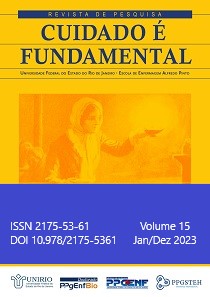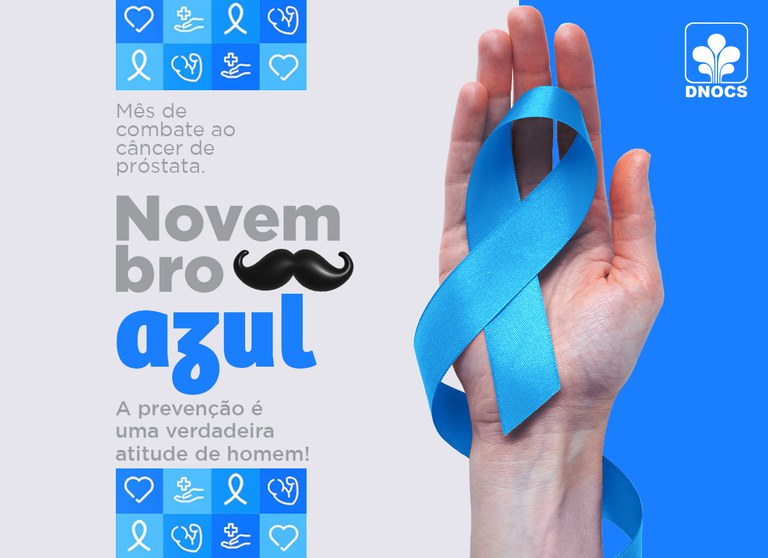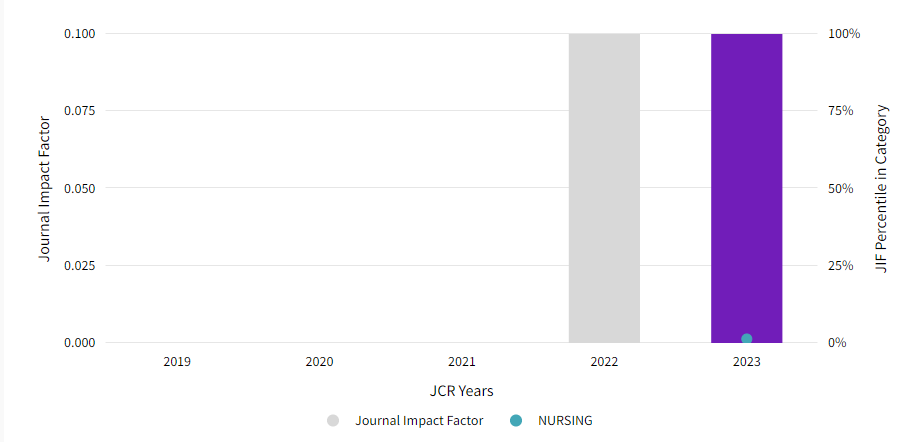Satisfaction and self-confidence with realistic simulation as an active teaching-learning method / Satisfação e autoconfiança com a simulação realística como método ativo de ensino aprendizagem
DOI:
https://doi.org/10.9789/2175-5361.rpcfo.v15.12945Keywords:
Simulation, Learning, Teaching, Personal satisfaction, NursingAbstract
Objective: To analyze the satisfaction and self-confidence of students in a realistic simulation clinical setting. Method: Almost experimental and quantitative study. Sociodemographic questionnaire, pre-test and post-test knowledge, scenario verification checklist, and satisfaction and self-confidence scale were applied. Approved by the Research Ethics Committee under opinion number 05290\2021. Results: Sample composed of 53 students from the 4th year of Nursing at a University Center in Araras/SP in 2021. The majority did not have previous training, but all showed more correct answers in the post-test. All considered the teaching methods used in the simulation useful and effective, 94.3% understood that the way the teacher taught was adequate for obtaining knowledge, 64.1% are more confident in mastering the content. Conclusion: The combination of active methodologies and realistic simulation resulted in an increase in knowledge and self-confidence of students for the training of qualified professionals.
Downloads
References
Kaneko RMU, Couto TB, Coelho MM, Taneno AK, Barduzzi NN, Barreto JKS, et al. Simulação in Situ, uma Metodologia de Treinamento Multidisciplinar para Identificar Oportunidades de Melhoria na Segurança do Paciente em uma Unidade de Alto Risco. Revista Brasileira de Educação Médica [Internet]. 2015 [acesso em 28 de abril 2021]; 39(2):286–93. Disponível em: https://www.scielo.br/j/rbem/a/z5L5c5GGpwRqWpP8hGJ8r8x/abstract/?lang=pt
Carvalho RE. Cartografia do trabalho docente na e para a educação inclusiva. Revista Ambiente e Educação. [Internet]. 2018. [acesso em 28 de abril 2021]; 1(2). Disponível em: https://publicacoes.unicid.edu.br/index.php/ambienteeducacao/article/view/586
Brandão FS, Collares CF, Marin F. A simulação realística como ferramenta educacional para estudantes de medicina. Sci med. [Internet]. 2014. [acesso em 28 de abril 2021]; 187–92. Disponível em: https://pesquisa.bvsalud.org/portal/resource/pt/lil-742489
Bellaguarda MLR, Silva NK, Canever BP, Tholl AD, Alvarez AG, Teixeira GC. Simulação realística como ferramenta de ensino na comunicação de situação crítica em cuidados paliativos. Escola Anna Nery. [Internet]. 2020. [acesso em 19 de julho 2021] ;24(3):e2019027. Disponível em: https://www.scielo.br/j/ean/a/3xqH84Zz3mwxjysxtQskWvG/#ModalTutors
Mesquita HCT, Santana BS, Magro MCS. Efeito da simulação realística combinada à teoria na autoconfiança e satisfação de profissionais de enfermagem. Escola Anna Nery. [Internet]. 2019. [acesso em 19 de julho 2021]; 23:e20180270. Disponível em: https://www.scielo.br/j/ean/a/z36P4FnBxmkXtXGL7VT6DxD/abstract/?lang=pt
Miranda RPR, Motta AL, Chaves ECL, Resck ZMR, Iunes DH. A Aplicabilidade Do Uso De Simulação Realística Na Formação Permanente Do Profissional De Enfermagem. Revista Interdisciplinar de Estudos em Saúde. [Internet]. 2015. [acesso em 19 de novembro de 2021]; 4(2):54–62. Disponível em: https://periodicos.uniarp.edu.br/index.php/ries/article/view/713
Almeida RGS, Mazzo A, Martins JCA, Baptista RCN, Girão FB, Mendes IAC. Validation to Portuguese of the Scale of Student Satisfaction and Self-Confidence in Learning. Revista Latino-Americana de Enfermagem. [Internet]. 2015. [acesso em 28 de abril 2021]; 23(6):1007–13. Disponível em: https://www.scielo.br/j/rlae/a/7fyQp4sk7xrVLc8WxrbLLqy/#ModalTutors
Araújo ALLS, Quilici AP. O que é simulação e por que simular. In: Quilici AP. Simulação Clínica: do conceito à aplicabilidade. São Paulo: Editora Atheneu, 2012. 1-16.
Negri EC, Mazzo A, Martins JCA, Pereira Junior GA, Almeida RG dos S, Pedersoli CE. Clinical simulation with dramatization: gains perceived by students and health professionals. Revista Latino-Americana de Enfermagem. [Internet]. 2017. [acesso em 9 de junho de 2021]; 25(0). Disponível em: https://www.scielo.br/j/rlae/a/QQxfsnbsqwYJCMmjRPp7xtB/
Barreto DG, Silva KGN, Moreira SSCR, Sousa T, Magro MCS. Simulação realística como estratégia de ensino para o curso de graduação em enfermagem. Revista Baiana de Enfermagem. [Internet] 2014. [acesso em 18 de março de 2021]; 28(2):208–214. Disponível em: https://pesquisa.bvsalud.org/portal/resource/pt/lil-759580
Waterkemper R, Prado ML. Estratégias de ensino-aprendizagem em cursos de graduação em Enfermagem. Av enferm. [Internet]. 2011. [acesso em 16 de fevereiro de 2023]; 29(2):234–246. Disponível em: http://www.scielo.org.co/scielo.php?script=sci_arttext&pid=S0121-45002011000200003
Santos MC, Leite MCL. A avaliação das aprendizagens na prática da simulação em Enfermagem como feedback de ensino. Revista Gaúcha de Enfermagem. [Internet] 2010. [acesso em 15 de janeiro 2022]; 31(3):552–556. Disponível em: https://www.scielo.br/j/rgenf/a/f5VrbhSHSzG3YkNNL3yRKqp/#
Mitre SM et al. Metodologias ativas de ensino-aprendizagem na formação profissional em saúde: debates atuais. Ciência saúde coletiva. [Internet] 2008. [acesso em 28 de março 2022];13(2):2133-44. Disponível em: https://www.scielosp.org/pdf/csc/v13s2/v13s2a18.pdf
Raniere R, Maria S, Martins A, Rita. A simulação no ensino de enfermagem: reflexões e justificativas a luz da bioética e dos direitos humanos. Acta bioeth. [Internet]. 2018. [acesso em 28 de abril 2021]; 24(1):31–8. Disponível em: https://pesquisa.bvsalud.org/portal/resource/pt/biblio-949305
Costa RR de O, Medeiros SM de, Coutinho VRD, Veríssimo CMF, Silva MMM da, Lucena EE de S. Simulação clínica no desempenho cognitivo, satisfação e autoconfiança na aprendizagem: estudo quase-experimental. Acta Paulista de Enfermagem. [Internet] 2020. [acesso em 25 de agosto 2021]; 33:eAPE20180123. Disponível em: https://www.scielo.br/j/ape/a/bdkybfTZpb5xg37jGMw7Cjb/?lang=pt
Published
How to Cite
Issue
Section
License
Copyright (c) 2023 Revista de Pesquisa Cuidado é Fundamental Online

This work is licensed under a Creative Commons Attribution-NonCommercial-ShareAlike 4.0 International License.
TRANSFER AGREEMENT COPYRIGHT I transfer copyright of the article to the Journal of Care Survey is Fundamental - Online - RPCF, so it is accepted due to electronic publishing. The copyright includes the right to reproduce in whole or in part by any means, distributing that article, including figures, photographs, and any translations. The author can also print and distribute copies of your article, stating that since the rights belong to RPCF. I declare that this manuscript is original and has not been submitted for publication, in whole or in part to other online journals or not, so BMMC in the Annals of scientific events or book chapters.




























